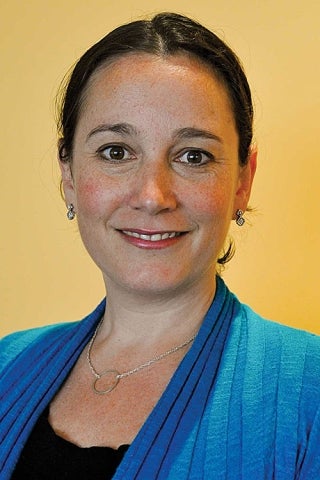Both mitigation — the efforts to reduce greenhouse gas emissions — and adaptation to existing climate changes will be on the table at the critical climate negotiations in Paris this fall. But until recently, adaptation was considered throwing in the towel, says
Heather Coleman ’04 M.E.M., the Climate Change Policy Manager at
Oxfam America. In that role, Coleman works on climate policy to help protect vulnerable communities from the worst effects of climate change.
Oxfam, Coleman says, really helped to put adaptation on the map by calculating the cost of adaptation in developing countries. “You can’t talk about mitigation without addressing adaptation,” she said in a recent interview. “Nor should you politically. It creates more urgency to talk about adaptation. Looking at impacts today brings more urgency to the issue, to make sure that impacts don’t create more disparity in the future.”
Coleman will be the recipient of the inaugural Prospect Street Award at the F&ES
Reunion Weekend, October 9-11. The award recognizes a recent F&ES graduate who has made significant contributions to the environmental field and who exemplifies the spirit of the School through demonstrated leadership, innovation, and creativity.
Coleman has worked on climate policy for the last decade. Prior to Oxfam, she was a climate policy analyst at Environment Northeast and NESCAUM, a regional air quality and climate change association of the eight northeastern U.S. states where she helped develop The Climate Registry and design and implement the Regional Greenhouse Gas Initiative. A former Switzer Environmental Fellow, she currently serves as Board Chair for the U.S. Climate Action Network.
She was initially drawn to Oxfam because she wanted to engage with climate change from a human perspective. “Climate change is not an environmental issue, it’s a social issue,” she said. “We are beyond the point when a group of green organizations make up the core of the climate movement. Our movement is far broader and deeper than that.”
When Coleman arrived at Oxfam, she knew very little about development compared to other employees who’d spent their entire careers in the field. Unlike most of her peers who were drawn to development, she took few social science courses at F&ES. Instead, Coleman focused on climate and energy policy. But some of her most memorable courses were silviculture with
Mark Ashton ’85 M.F., ’90 Ph.D., and biogeochemistry with
Gaboury Benoit. “These courses gave me the fundamentals,” Coleman says, “the language, understanding, and confidence to develop policy.”
Agriculture is responsible for two-thirds of the country’s greenhouse gas emissions, and globally agricultural emissions are on the rise. Coleman uses multiple stakeholder engagement to develop climate policy in the agriculture sector. For example, she helped launch Oxfam’s
Behind the Brands campaign several years ago. The campaign ranks the 10 largest food and beverage companies on several indicators, including climate and greenhouse gas emissions.
Although food and beverage companies often tout their emissions reduction goals, they are not accountable for production — so-called “Scope 3” — emissions generated by commodities production. But Coleman says these companies have a responsibility to address climate resilience in the communities where they work. Two industry leaders, General Mills and Kellogg’s, did not perform well in the rankings. Through public mobilization, social media, direct action, and negotiations, Coleman was able to convince both companies to set targets and make commitments to reduce greenhouse gas emissions. As a result, they are now measuring, reducing, and publishing their emissions across entire supply chains.
The Paris talks, Coleman says, are significant because they will bring the major emitters to the table to create a framework for future mitigation and adaptation mechanisms. “We’re not going to get the level of ambition we need at Paris,” she says, “but we are going to set up a process for ensuring that that level of ambition is strengthened over time. And the Paris talks send a signal to governments and investors that we are steadily moving toward a decarbonized economy.”
Coleman’s focus at the talks will be ensuring that developing countries contribute to this shift, but also that they get the support they need to build climate resilience. Currently, developed nations have not met their financial obligations as outlined in the Copenhagen accord. The key, according to Coleman, is to make wealthier nations more accountable to their commitments.
When asked about domestic climate policy, Coleman notes that progress has been made over the past decade, but says significant work remains to curb the worst effects of climate change. “When you work on Capitol Hill, a lot of people will tell you that they get it, that they need to start working on these issues,” Coleman says. “But the problem is that it’s still a hot-button partisan issue.” She believes that is unlikely to change in a public way during the 2016 election cycle. The interesting thing, she says, will be to see how big of a role climate change plays in the Democratic Party platform next year.
“If Democrats are rallying around climate change, talking about this at every rally; if they see this as a way to generate more public support around their candidate; if climate change is brought in the debate as a central issue. That would be progress. It’s not whether Republicans are talking about climate change,” Coleman says. “I think in the long term we can get there, but we can only get there if the Democrats are willing to make this more of a central part of their platform, and we haven’t seen this in previous elections.”
 Heather Coleman
Heather Coleman